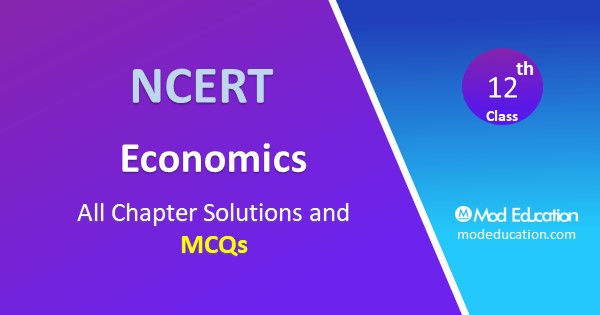MCQ Questions for Class 12 Economics Chapter 5 : Class 12 Chapter 5 “Government Budget and the Economy” MCQ Questions for Class 12 Economics with Answers PDF Free Download here according to the latest CBSE syllabus and NCERT curriculum.

MCQ Questions for Class 12 Economics Chapter 5 Government Budget and the Economy with PDF
Here CBSE RBSE and Other State Board NCERT Objective MCQ Questions of Class 12 Economics Chapter 5 “Government Budget and the Economy” with Answers Pdf will guide students to do a quick revision for all chapter.
Q1. When government spends more than it collects by way of revenue, it incurs __
(A) Budget surplus
(B) Budget deficit
(C) Capital expenditure
(D) Revenue expenditure
(B) Budget deficit
Q2. The fiscal deficit is the difference between the government’s total expenditure and its total receipts excluding __
(A) Interest
(B) Taxes
(C) Spending
(D) Borrowings
(D) Borrowings
Q3. Which of the following is the component of a budget?
(A) Fiscal budget
(B) Capital budget
(C) Both of these
(D) None of these
(D(C) Both of these
Q4. What is the annual statement of the government’s fiscal revenue and fiscal expenditure known?
(A) Budget
(B) Fiscal Budget
(C) Capital Budget
(D) All of these
(B) Fiscal Budget
Q5. How many types of revenue receipts are there?
(A) 2
(B) 3
(C) 4
(D) 6
(A) 2
Q6. The amount collected by the government as taxes and duties is known as _
(A) Capital receipts
(B) Tax revenue receipts
(C) Non-tax revenue receipts
(D) All of these
(B) Tax revenue receipts
Q7. The amount collected by the government in the form of interest, fees, and dividends is known as __
(A) Tax-revenue receipts
(B) Capital receipts
(C) Non-tax revenue receipts
(D) None of these
(C) Non-tax revenue receipts
Q8. Borrowing in the government budget is:
(A) Revenue deficit
(B) Fiscal deficit
(C) Primary deficit
(D) Deficit in taxes
(B) Fiscal deficit
Q9. The non-tax revenue in the following is:
(A) Export duty
(B) Import duty
(C) Dividends
(D) Excise
(C) Dividends
Q10. The primary deficit in a government budget will be zero, when _
(A) Revenue deficit is zero
(B) Net interest payments are zero
(C) Fiscal deficit is zero
(D) Fiscal deficit is equal to interest payment
(D) Fiscal deficit is equal to interest payment
Q11. Direct tax is called direct because it is collected directly from:
(A) The producers on goods produced
(B) The sellers on goods sold
(C) The buyers of goods
(D) The income earners
(D) The income earners
Q12. Financial Year in India is:
(a) April I to March 31
(b) January 1 to December 31
(c) December 1 to September 30
(d) None of the above
(a) April I to March 31
Q13. Which objectives government attempts to obtain by Budget
(a) To Promote Economic Development
(b) Balanced Regional Development
(c) Redistribution of Income and Wealth
(d) All the above
(d) All the above
Q14. Which is a component of Budget?
(a) Budget Receipts
(b) Budget Expenditure
(c) Both (a) and (b)
(d) None of the above
(c) Both (a) and (b)
Q15. Which is a component of the Budget Receipt?
(a) Revenue Receipt
(b) Capital Receipt
(c) Both (a) and (b)
(d) None of the above
(c) Both (a) and (b)
Q16. Tax revenue of the Government includes :
(a) Income Tax
(b) Corporate Tax
(c) Excise Duty
(d) All of these
(d) All of these
Q17. Which is included in the Direct Tax?
(a) Income Tax
(b) Gift Tax
(c) Both (a) and (b)
(d) Excise Duty
(c) Both (a) and (b)
Q18. Which is included in Indirect Tax?
(a) Excise Duty
(b) Sales Tax
(c) Both (a) and (b)
(d) Wealth Tax
(c) Both (a) and (b)
Q19. The expenditures which do not create assets for the government is called :
(a) Revenue Expenditure
(b) Capital Expenditure
(c) Both (a) and (b)
(d) None of the above
(a) Revenue Expenditure
Q20. Direct tax is :
(a) Income Tax
(b) Gift Tax
(c) Both (a) and (b)
(d) None of these
(c) Both (a) and (b)
Q21. In India, one rupee note is issued by:
(a) Reserve Bank of India
(b) Finance Ministry of Government of India
(c) State Bank of India
(d) None of these
(b) Finance Ministry of Government of India
Q22. Capital budget consist of:
(a) Revenue Receipts and Revenue Expenditure
(b) Capital Receipts and Capital Expenditure
(c) Direct and Indirect Tax
(d) None of these
(b) Capital Receipts and Capital Expenditure
